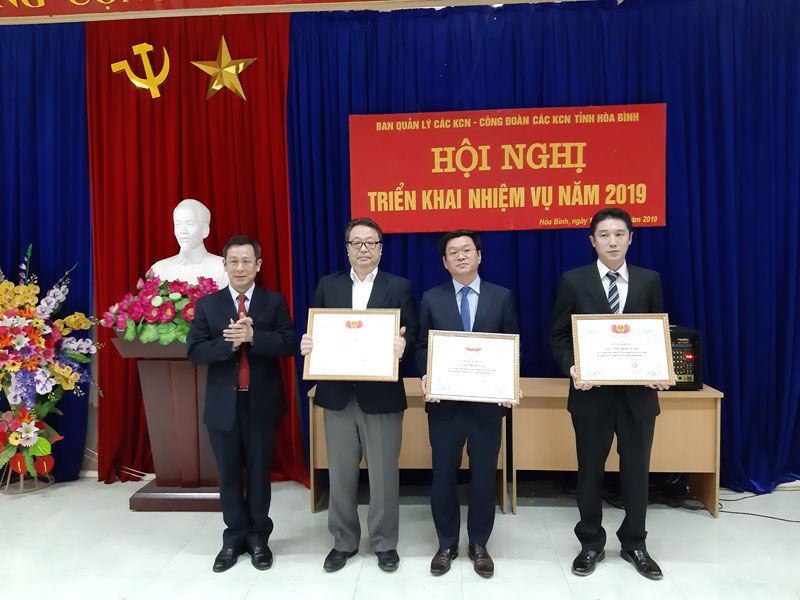
(HBO) – The Hoa Binh Industrial Park Management Board has held a conference to review its performance in 2018 and launch tasks for 2019. Vice Chairman of the provincial People’s Committee Bui Van Khanh attended the event.
In 2018, the board successfully completed the state management tasks over
local industrial parks (IP), while continuing to maintain the effectiveness of
construction planning investment and environmental resources and business
management, and deploying solutions to support enterprises in removing
difficulties in implementing investment projects, thus surpassing all the
targets of industrial development.

![]()
Leaders of the provincial Industrial Park Management Board reward three
enterprises with strong performance in environmental protection
In 2018, the board ranked 14th out of 20 provincial units in the public
administrative reform (PAR) index and fourth in terms of IT application,
becoming a unit that successfully completed all tasks.
By the end of 2018, local IPs had hosted 87 projects, including 23 FDI
projects with a registered capital of 605.4 million USD and 64 domestic
projects with combined capital of 7.25 trillion VND. As many as 49 projects
have become operational, producing total revenue of 15.28 trillion VND and
export value of 596 million USD, contributing 201 billion to the State budget
and creating jobs for 17,858 workers, of which 90 percent are local labourers.
In 2019, the board aims to reach the occupation rate in Luong Son IP at
100 percent, Da River Left Bank IP at 80 percent. It will complete essential
infrastructure investment in Mong Hoa and Yen Quang IPs, while supporting and
facilitating project to come into operation. It will work to attract eight new
projects, and help five others to become operational.
Speaking at the conference, Vice Chairman of the provincial People’s
Committee Bui Van Khanh recognised the achievements of the board and businesses
which contributed positively to transforming local economic structure, local
budget collection and the creation of jobs for local labourers. He pointed out
the difficulties and shortcomings in the operation of the IPs, suggesting that
in 2019, the board strengthen coordination with departments, agencies and
localities to focus on solving problems in site clearance, and investment in
technical infrastructure in Mong Hoa, Yen Quang and Da River Left Bank IPs,
thus creating a clear land stock to attract investment.
He also asked the board to ensure stable power supply for production, pay due
attention to environmental protection, apply solutions to improve the business
environment, and solve difficulties to support projects to soon become
operational, thus contributing to the sustainable transformation of the
province’s economic structure./.
Hoa Binh province is undergoing a dynamic transformation amid Vietnam’s national digital transition. Building on Poliburo’s Resolution No. 57-NQ/TW on breakthroughs in science, technology, innovation, and national digital transformation, the province has rolled out a wide range of practical action plans. A standout initiative is the "Digital Literacy for All” movement, an effort to ensure that no one is left behind in the digital era.
Hoa Binh province is undergoing a dynamic transformation in the wake of the national digital transformation movement. Building on Resolution No. 57-NQ/TW of the Politburo on breakthroughs in science, technology, innovation, and national digital transformation, the province has implemented a wide range of practical action plans. A standout initiative is the "Digital Literacy for All” movement ambitious effort to ensure that no one is left behind in the digital age.
With a spirit of unity and proactive problem-solving, the Party Committee, the government and the people of Dong Lai Commune (Tan Lac District) have made great strides in implementing the resolutions of the 24th Party Congress of the commune for the 2020 - 2025 term. Focusing on leadership and practical actions, the commune has brought the Party’s resolutions into daily life, creating strong impacts and pushing the local development forward.
Amid the nationwide push for digital transformation, young people in Hoa Binh Province are stepping up as dynamic pioneers, applying technology to enhance Youth Union operations and expand the reach of youth-led initiatives. Through creativity and adaptability, Youth Union organizations at all levels have introduced a series of practical solutions, contributing to modern governance and community development.
In recent years, An Nghia commune, located in Lac Son district, has stepped up administrative reform, focusing on improving the quality and efficiency of its single-window service unit for receiving and processing administrative procedures. These improvements have helped create favourable conditions for local residents and organisations to handle administrative procedures, contributing to the commune’s broader socio-economic development.
The Prime Minister-approved master plan to develop the multi-use value of forests ecosystems through 2030, with a vision to 2050, aims to improve the management and sustainable use of forest resources, create jobs, increase incomes, and improve the living standards of ethnic minorities, people in mountainous and remote areas, forest workers and those living near forests.



